Cite this document
(Constructions of Race in Culture and Politics Essay, n.d.)
Constructions of Race in Culture and Politics Essay. https://studentshare.org/sociology/1785432-constructions-of-race-in-culture-and-politics
Constructions of Race in Culture and Politics Essay. https://studentshare.org/sociology/1785432-constructions-of-race-in-culture-and-politics
(Constructions of Race in Culture and Politics Essay)
Constructions of Race in Culture and Politics Essay. https://studentshare.org/sociology/1785432-constructions-of-race-in-culture-and-politics.
Constructions of Race in Culture and Politics Essay. https://studentshare.org/sociology/1785432-constructions-of-race-in-culture-and-politics.
“Constructions of Race in Culture and Politics Essay”. https://studentshare.org/sociology/1785432-constructions-of-race-in-culture-and-politics.


